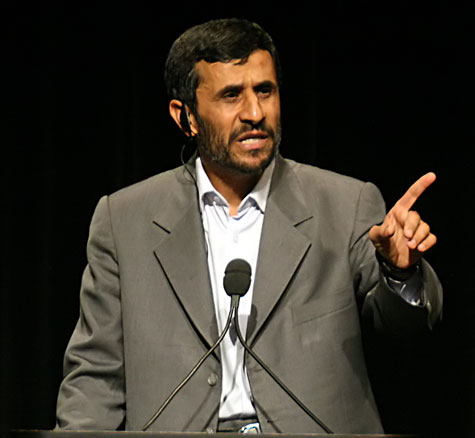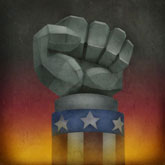Obama’s Iran Policy to Focus on Human Rights, Not Election
As reports of political violence in Iran intensified after Friday’s fiercely disputed election, the Obama administration insisted that it would not interfere with the struggle for power between regime-backed President Mahmoud Ahmadinejad and the thousands of demonstrators who contend the election was stolen.
Jul 31, 20201.7K Shares46.1K Views
As reports of political violence in Iran intensified after Friday’s fiercely disputed election, the Obama administration insisted that it would not interfere with the struggle for power between regime-backed President Mahmoud Ahmadinejad and the thousands of demonstrators who contend the election was stolen. Administration officials, on and off the record, said that President Obama would offer support for human rights in Iran generally and would not back away from his diplomatic outreach to the longtime U.S. adversary, regardless of the ultimate outcome of the election.
The stance began to attract criticism on Sunday, with some politicians arguing that the United States needed to come out firmly on the side of protesters who have been victimized by regime-backed violence and had their communications with the outside world restricted. But the administration’s position has the support of Iranian human rights groups, which fear the clerical regime will exploit any perception of U.S. interference to slander the opposition as American puppets — a caustic charge in a nation with a deep memory of U.S. interference in its politics.
Illustration by: Matt Mahurin
Since the Iranian government certified the election returns on Saturday, in which Ahmadinejad was said to have won 62 percent of the vote to opposition figure Mir Hossein Moussavi’s 30 percent, the Obama administration released two public statements, neither of which expressed judgment nor condemnation of an election widely believed to have been rigged. White House Press Secretary Robert Gibbs praised the “vigorous debate and enthusiasm that this election generated, particularly among young Iranians” and pledged that the administration would monitor “reports of irregularities.” On NBC’s “Meet The Press” the next day, Vice President Joe Biden went further, saying there was “some real doubt” about Ahmadinejad’s alleged victory, but added that the international community needed to conduct “analysis” before reaching any conclusions.
A senior Obama administration official who did not want to be identified or quoted explained that the president was deeply conscious of appearing not to favor any side in the election. Officials had ruled out calling for a recount or a revote out of a concern for undermining the Iranian opposition. The official said it was important to have a policy toward Iran that advanced the administration’s desire for liberalization and human rights in Iran, not one that merely vented American outrage at Ahmadinejad.
If and when Obama speaks about the violence in Iran over the coming days, the official predicted, he will emphasize the need for respecting human rights in Iran and for Iranians to reach their own solution. Potential multilateral efforts at calling attention to electoral improprieties and the resulting violence were said to be on the radar of U.N. Ambassador Susan Rice. No administration official mentioned recognizing the legitimacy of Ahmadinejad’s proclaimed victory at this point as a policy option under consideration, in keeping with Biden’s call for further “analysis” about the true election result, despite the fact that the European Union’s presidency, currently held by the Czech Republic, recognized Ahmadinejad as the victordespite noting “irregularities” in the vote.
But in no case will the administration back away from its long-expressed desire to directly engage Iran diplomatically. “Talks with Iran are not a reward for good behavior,” Biden said. The senior administration official noted that regardless of the ultimate outcome of the election, Supreme Leader Ali Khamenei — who, in an unusual move, endorsed the election outcome immediately, instead of waiting the customary three daysfor the vote to become clear — sets foreign policy for Iran, not the president. At the same time, the official said, the administration would not have endless patience for unreciprocated outreach.
That position began to come under criticism on Sunday. The post-election violence “certainly makes such a dialogue much more difficult,” said Sen. Susan Collins (R-Maine) on CNN, “but frankly I’ve always been skeptical of any kind of dialogue with the hardline leaders of Iran.” Sen. Joseph Lieberman (I-Conn.), issued a statement urging Obama and others to “speak out, loudly and clearly, about what is happening in Iran right now and unambiguously express their solidarity with the brave Iranians who went to the polls in the hope of change and who are now looking to the outside world for strength and support.”
But some Iranian human rights activists backed Obama’s cautious approach. “I think it’s wise for the U.S. government to keep its distance,” said Hadi Ghaemi, a New York-based spokesman for the International Campaign for Human Rights in Iran, which wants the international community not to legitimize the Iranian regime’s claim that Ahmadinejad won the election. While the Obama administration ought to express support for the Iranian opposition’s safety and for human rights in Iran as the regime clamps down on dissent, any expression of political support for the protesters would only “instigate the cry that the reformers are somehow driven and directed by the United States, whether under [former President George W. Bush] or under Obama, and there’s no reason to give that unfounded allegation” any chance to spread.
Trita Parsi, the founder of the National Iranian American Council who has played a leading role in the American press over the weekend in denouncing Ahmadinejad and defending the protesters, said that Obama was taking care not to subvert the Iranian opposition. “The framing that Ahmadinejad is presenting is one in which essentially the whole [opposition] is a Western media conspiracy,” he said. “If the administration is saying things or doing things before Moussavi and the opposition figures out what the plan is, then that’s a real problem, because then it seems like it’s between Ahmadinejad and the west and not Ahmadinejad and the opposition. So the administration is doing exactly the right thing. They’re not rushing in and they’re not playing favorites. They might prefer the democratic process to be respected, but that’s different than [supporting a] specific faction.”
Parsi took issue with Lieberman’s statement and those of others who have urged the United States to back the opposition. “They’re saying ‘Support Moussavi.’ Well, did you talk to Moussavi to learn if this is helpful? A lot of people seem to have the propensity of knowing what the Iranian people want or what specific people want but [don't] contact them. And in past it’s been detrimental” to Iranian opposition figures, Parsi said. If such American politicians have “not learned from that, it’s sad.”
Ghaemi said that a proper response from the international community ought to come from United Nations Secretary-General Ban Ki-moon, who he said ought to denounce the theft of the election and the resulting regime-instigated violence. “We should not have the U.S. lead,” he said.
That approach might garner support from the Arab world. Hussein Ibish, a senior fellow with the American Task Force on Palestine, said that the Arab states of the Middle East were “largely disappointed by these announced results,” since antipathy to Ahmadinejad’s inflammatory rhetoric runs high in the region and Iran’s Arab neighbors do not relish the prospect of an Iranian regime reckless enough to steal an election. But he said that much like the rest of the world, Arab capitols ought not to interfere with the process. “A perception of external pressure on internal Iranian affairs is bound to be counterproductive and strengthen the hand of the religious far-right,” Ibish said. “Defensive nationalist sentiment has been a hallmark of Ahmadinejad’s appeal to Iranians, as it usually is with demagogues around the world.”
This weekend has seen the worst sustained internal political violence in Tehran since the 1979 Islamic Revolution. The regime has managed to shut down most forms of communication with the outside world, including most e-mail access, SMS and Facebook. Yet as of Sunday night Iranians are still managing to access Twitter, and the accounts they tweet detail an opposition using the symbols of the 1979 revolution against the regime that governs in its name. An opposition Twitter account called StopAhmadi reported, “ Another Iranian Twitter user, PersianKiwi, announced, “
But however much sympathetic Americans might wish the Obama administration to express more forthright support for the embattled protesters, analysts believe that doing so would ultimately set back their struggle. It was important, Parsi said, for any non-Iranian organization wishing to show solidarity with the opposition to ensure that “anything they do is two steps behind the opposition and not two steps ahead.” The current struggle, he said, is “not a battle in the slightest to be fought by any in the international community or any entity. Iranians have tremendous pride in doing this themselves.”

Paula M. Graham
Reviewer
Latest Articles
Popular Articles

